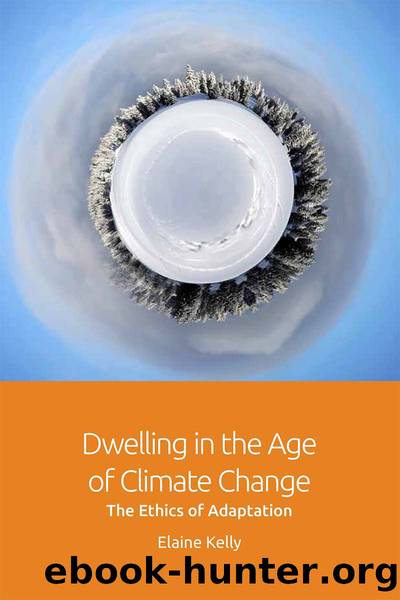Dwelling in the Age of Climate Change by Kelly;

Author:Kelly;
Language: eng
Format: epub
Publisher: Edinburgh University Press
IN PRACTICE: AUSTRALIAâBANGLADESH AND THE POSSIBILITY OF WELCOME
The previous sections have detailed the philosophical resources we have available to us for rethinking responsibility and hospitality through poststructuralist thinkers such as Levinas and Derrida. I have acknowledged the difficulty we face if we try to create normative programmes from these ideas. It is now important that we consider how Derridaâs work on the tension between calculation (that is, doing our best to predict and therefore organise) and the incalculable (or the inherent unknowability of the future, of what is to come, of the uniqueness of the situation) has the potential to shape or influence how we respond politically to the challenges of climate mobility. Despite the temptation to side with the excessive generosity of unconditional welcome, we must instead (and perhaps more modestly) work to âimprove the conditions of conditional hospitalityâ rather than attempting to attain an impossible state (Derrida 2001b).14
In light of these ideas, I will outline one possible policy related to the development of new âpro-poorâ economic migration schemes. In doing so, I will consider what a bilateral agreement between Australia and Bangladesh might look like. My focus on a bilateral arrangement is strategic and political, but should not be taken to exclude regional and multinational negotiations as part of the solution to flows of people in the Asia-Pacific region. Australia is a considerably privileged nation-state within the region and a high-emitter per capita of greenhouse gases, two characteristics that invoke the ethical paradigm of âdistributed responsibilityâ. On a pragmatic note, small-scale bilateral agreements concerned with labour migration are possible with the Australian government, as per the KANI arrangement with the government of Kiribati (discussed below). It is for these reasons that I advocate a bilateral proposal as a starting point.
In an Australian setting, scholars have begun to formulate what managed climate migration might look like. For instance, migration expert Khalid Koser has proposed the expansion of existing immigration policy to include environmental migration. He has argued that:
What is required is a national policy framework on environmental migration with three main components: continuing support for multilateral agreements on environmental migration; capacitybuilding in origin and transit countries; and national legislation for environmental migrants arriving in Australia that leverages existing labour migration programs and targets a limited number of countries. (Koser 2012: 1)
Koserâs suggestions encompass changes in current governance and legal migration processes. He contends that there is scope built into the existing migration programme to facilitate its expansion to include multilateral agreements with numerous other nation-states, developing labour migration streams. In other words, Koser emphasises the importance of managing migration, a process that allows the nation-state to normalise and contain the impact of human movement by integrating such peoples into economic agendas.
A positive implication of Koserâs national environmental migration framework is the potential it has to redress international inequities and intergenerational injustices. This can be achieved by ensuring that the multinational agreements are signed with countries in the Asia-Pacific region, an area that will bear the brunt of climate change impacts.
Download
This site does not store any files on its server. We only index and link to content provided by other sites. Please contact the content providers to delete copyright contents if any and email us, we'll remove relevant links or contents immediately.
The European Opportunity by Felipe Fernández-Armesto(589)
The European History Highway: A Guide to Internet Resources by Dennis A. Trinkle Scott A. Merriman(546)
Morgan Kaufmann Digital Watermarking and Steganography by Ingemar Cox Matthew Miller Jeffrey Bloom Jessica Fridrich Ton(541)
The Seven Wonders of the Ancient World by Michael Denis Higgins(534)
Hyperculture by Byung-Chul Han(527)
European Security without the Soviet Union by Stuart Croft Phil Williams(516)
The Routledge companion to Christian ethics by D. Stephen Long Rebekah L. Miles(514)
European Security in a Global Context by Thierry Tardy(511)
Get Real with Storytime by Julie Dietzel-Glair & Marianne Crandall Follis(457)
Hudud Al-'Alam 'The Regions of the World' - a Persian Geography 372 A.H. (982 AD) by V. V. Minorsky & C. E. Bosworth(450)
Tibetan Studies in Comparative Perspective by Chih-yu Shih Yu-Wen Chen(444)
Gorbachev And His Generals by William C. Green(434)
Governance, Growth and Global Leadership by Espen Moe(431)
CliffsNotes on Fitzgerald's The Great Gatsby by Kate Maurer(419)
How Languages Are Learned 5th Edition by Patsy M Lightbown;Nina Spada; & Nina Spada(414)
The Oxford History of the World by Fernández-Armesto Felipe;(400)
The Egyptian Economy, 1952-2000 by Khalid Ikram(392)
The Oxford Handbook of the Incas by Sonia Alconini(379)
Oral Poetry and Narratives from Central Arabia: The Poetry of Ad-Dindan : A Bedouin Bard in Southern Najd (Studies in Arabic Literature, Vol 17) (English and Arabic Edition) by P. M. Kupershoek P. Marcel Kurpershoek(371)
